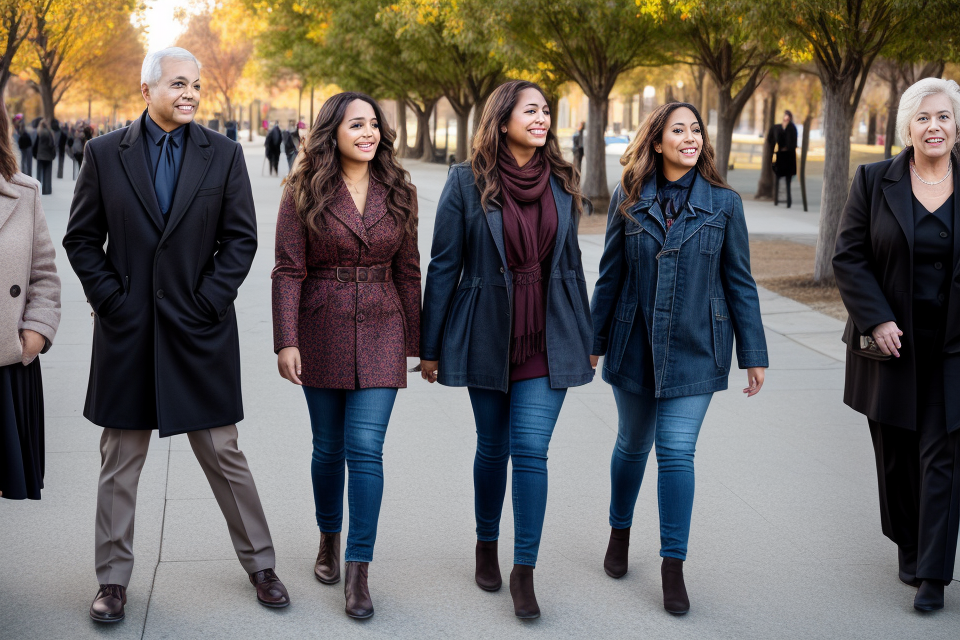Cultural values are the principles and beliefs that shape the way we think, behave, and interact with others. They are the essence of a society and are passed down from generation to generation. In this guide, we will explore the essence of good cultural values, and what makes them valuable to individuals and communities. We will delve into examples of good cultural values that have stood the test of time, and how they contribute to the well-being of society. Get ready to discover the importance of cultural values and how they can positively impact your life.
Understanding Cultural Values
Definition and Importance
Cultural values refer to the beliefs, attitudes, and practices that are shared by a group of people and are transmitted from one generation to another. These values are shaped by a variety of factors, including history, religion, language, and customs. They play a crucial role in shaping societies and influencing individual behavior.
The importance of cultural values lies in the fact that they provide a framework for understanding and interpreting the world around us. They help to define what is considered important, desirable, or undesirable in a given society. Good cultural values promote social harmony, respect for diversity, and the well-being of individuals and communities. On the other hand, negative cultural values can lead to discrimination, prejudice, and social unrest.
In addition, cultural values are essential for maintaining a sense of identity and belonging. They help to define who we are as individuals and as members of a particular group. They provide a shared language and common references that help to foster social cohesion and mutual understanding.
Moreover, cultural values can influence economic and political development. Countries with strong cultural values that promote education, innovation, and entrepreneurship tend to have higher levels of economic growth and technological advancement. Similarly, cultural values that promote democracy, human rights, and the rule of law can contribute to political stability and good governance.
Overall, cultural values are a crucial aspect of human society, shaping our beliefs, behaviors, and interactions with others. Understanding the essence of good cultural values is essential for promoting social harmony, respect for diversity, and the well-being of individuals and communities.
Characteristics of Good Cultural Values
- Universal Applicability
Good cultural values are applicable to all individuals and communities, regardless of their background or circumstances. They are grounded in human dignity and the belief that all people have inherent worth and potential. - Tolerance and Respect for Diversity
Good cultural values promote tolerance and respect for diversity, recognizing that individuals and communities have different perspectives, beliefs, and practices. They encourage open-mindedness and the appreciation of differences, while also promoting understanding and empathy. - Emphasis on Social Harmony and Cohesion
Good cultural values emphasize the importance of social harmony and cohesion, promoting cooperation, collaboration, and mutual support among individuals and communities. They encourage the creation of inclusive and supportive environments that foster social connection and the well-being of all members. - Encouragement of Personal Growth and Development
Good cultural values encourage personal growth and development, recognizing that individuals have unique talents, strengths, and potential. They promote self-awareness, self-reflection, and the pursuit of personal goals, while also encouraging individuals to contribute to the well-being of their communities. - Sustainability and Environmental Stewardship
Good cultural values promote sustainability and environmental stewardship, recognizing the interdependence of humans and the natural world. They encourage responsible and ethical use of resources, conservation of the environment, and the pursuit of sustainable practices that support the well-being of future generations.
The Origins of Cultural Values
Historical Perspectives
The historical perspectives on the origins of cultural values are crucial in understanding how they have evolved over time. Religion and philosophy have played a significant role in shaping cultural values, as they often provide moral frameworks and principles that guide behavior.
- Religion and Morality: Many religions have their own set of moral codes and values that shape the beliefs and actions of their followers. For example, Christianity emphasizes values such as compassion, forgiveness, and humility, while Islam places a strong emphasis on justice, equality, and charity. These religious values can have a profound impact on the cultural values of societies where these religions are prevalent.
- Philosophy and Ethics: Philosophers have also contributed to the development of cultural values through their writings and teachings. Ethical theories such as utilitarianism, deontology, and virtue ethics have influenced the way people think about right and wrong behavior, and have helped shape cultural values related to justice, fairness, and morality.
- Historical Events and Social Movements: Historical events and social movements can also have a significant impact on cultural values. For example, the civil rights movement in the United States led to a shift in cultural values related to race and equality, while the feminist movement has influenced cultural values related to gender and women’s rights.
In summary, the historical perspectives on the origins of cultural values provide insight into how they have evolved over time and how they continue to shape the beliefs and actions of individuals and societies. Understanding these historical influences is crucial in developing a comprehensive guide to exploring the essence of good cultural values.
Cross-Cultural Comparisons
Cross-cultural comparisons play a vital role in understanding the origins of cultural values. By examining the similarities and differences between various societies, researchers can gain insight into the development and evolution of cultural values over time. This section will delve into the intricacies of cross-cultural comparisons and their significance in uncovering the essence of good cultural values.
Comparing Cultural Values Across Different Societies
Cross-cultural comparisons involve assessing the similarities and differences in cultural values across different societies. This approach enables researchers to identify patterns and trends that transcend geographical and cultural boundaries. By examining the cultural values of various societies, researchers can better understand the universal aspects of human nature and the unique factors that shape cultural norms and beliefs.
Identifying Common Themes and Variations
One of the primary objectives of cross-cultural comparisons is to identify common themes and variations in cultural values. By examining the values held by different societies, researchers can identify shared beliefs and attitudes that transcend cultural differences. These common themes may include concepts such as respect for authority, the importance of family, or the value of hard work.
However, it is also essential to recognize that cultural values can vary significantly between societies. These variations can be attributed to factors such as geography, history, religion, and political systems. By examining these variations, researchers can gain a deeper understanding of the diverse ways in which cultural values are shaped and expressed.
Benefits of Cross-Cultural Comparisons
Cross-cultural comparisons offer several benefits when it comes to understanding the essence of good cultural values. By examining the similarities and differences between various societies, researchers can identify universal principles that underpin cultural values. This knowledge can inform the development of policies and interventions aimed at promoting positive cultural values and addressing negative ones.
Additionally, cross-cultural comparisons can foster intercultural understanding and respect. By learning about the cultural values of other societies, individuals can develop a greater appreciation for the diversity of human experience. This understanding can help to break down barriers and promote more inclusive and tolerant societies.
In conclusion, cross-cultural comparisons play a crucial role in exploring the essence of good cultural values. By examining the similarities and differences in cultural values across different societies, researchers can gain a deeper understanding of the universal principles that underpin these values. This knowledge can inform the development of policies and interventions aimed at promoting positive cultural values and addressing negative ones, ultimately contributing to the creation of more inclusive and harmonious societies.
The Impact of Good Cultural Values on Society
Positive Effects
Enhancing Social Cohesion and Stability
Good cultural values have the ability to bring people together, creating a sense of unity and belonging. When individuals share common values, they are more likely to work together towards a common goal, fostering a sense of community and reducing conflicts. This, in turn, contributes to social cohesion and stability, creating an environment where individuals feel safe and secure.
Promoting Economic Development and Prosperity
Good cultural values also play a significant role in promoting economic development and prosperity. When individuals have a strong sense of work ethic and are committed to hard work, innovation, and entrepreneurship, they are more likely to create wealth and drive economic growth. Furthermore, good cultural values such as honesty, integrity, and fairness promote trust and cooperation, which are essential for building strong business relationships and creating a thriving economy.
Fostering Individual and Collective Well-being
Good cultural values also contribute to the well-being of individuals and communities. When individuals have a strong sense of purpose and are committed to living according to their values, they are more likely to experience a sense of fulfillment and satisfaction. Furthermore, when communities share common values, they are more likely to work together to create a supportive environment that promotes the well-being of all members. This, in turn, creates a positive ripple effect that benefits individuals and communities as a whole.
Negative Effects
Cultural values have the power to shape societies and influence the behavior of individuals within them. However, it is important to recognize that not all cultural values are positive or beneficial. Negative cultural values can have detrimental effects on individuals and communities, leading to a range of problems.
- The consequences of negative cultural values
- Low self-esteem and body image issues
- Gender-based violence and discrimination
- Prejudice and intolerance towards marginalized groups
- Corruption and lack of trust in institutions
- The potential for cultural values to reinforce inequality and discrimination
- Economic and social disparities
- Segregation and isolation of certain groups
- Lack of access to education and healthcare
- Political instability and conflict
Negative cultural values can perpetuate a cycle of harm and disadvantage, making it difficult for individuals and communities to progress and thrive. It is therefore crucial to recognize and address these negative cultural values in order to promote a more just and equitable society.
Promoting Good Cultural Values
Education and Awareness
The Role of Education in Shaping Cultural Values
Education plays a critical role in shaping cultural values by transmitting knowledge, skills, and attitudes from one generation to another. It has the power to instill values and beliefs that shape an individual’s worldview and influence their behavior. Education can promote good cultural values by providing a platform for the transmission of shared cultural norms, traditions, and customs. It can also help to challenge and transform negative cultural practices that perpetuate inequality and discrimination.
Strategies for Promoting Awareness and Understanding of Good Cultural Values
- Culturally-sensitive curriculum development: Educational institutions should develop curricula that are culturally sensitive and promote good cultural values. This can be achieved by incorporating cultural diversity and inclusivity in the curriculum, teaching critical thinking skills, and encouraging dialogue and debate on cultural issues.
- Teacher training: Teachers should be trained to promote good cultural values in the classroom. This can involve training on intercultural competence, conflict resolution, and human rights education. Teachers should also be equipped with the necessary skills to create a safe and inclusive learning environment that values diversity and promotes mutual respect.
- Community engagement: Educational institutions should engage with the wider community to promote good cultural values. This can involve partnering with local organizations, hosting cultural events, and inviting guest speakers to share their experiences and perspectives on cultural issues. Community engagement can help to build bridges between different cultural groups and promote mutual understanding and respect.
- Student-led initiatives: Students can play an important role in promoting good cultural values in their schools and communities. Educational institutions should provide opportunities for students to develop leadership skills and engage in projects that promote cultural diversity and inclusivity. This can involve organizing cultural events, developing awareness campaigns, and advocating for social justice issues.
By promoting education and awareness of good cultural values, we can create a society that values diversity, respects human rights, and promotes social justice for all.
Cultural Diplomacy and International Cooperation
Cultural diplomacy plays a vital role in promoting good cultural values by facilitating cross-cultural understanding and cooperation. This can be achieved through various means, such as:
- Cultural exchange programs: These programs provide opportunities for individuals from different cultures to learn about each other’s customs, traditions, and values. Through these programs, people can develop a deeper appreciation for cultural diversity and foster a sense of empathy and understanding.
- Arts and cultural events: Events such as festivals, exhibitions, and performances can bring people together and provide a platform for cultural exchange. These events can showcase the richness and diversity of different cultures, helping to break down stereotypes and promote mutual respect.
- Education and awareness-raising: Educational programs and campaigns can help to raise awareness about the importance of cultural values and promote a greater understanding of different cultures. This can include initiatives that encourage intercultural dialogue, as well as efforts to combat cultural prejudice and discrimination.
International organizations also play a crucial role in fostering cross-cultural understanding and cooperation. These organizations can provide a framework for collaboration and dialogue, as well as resources and support for cultural diplomacy initiatives. Some examples of international organizations that promote cultural diplomacy include:
- United Nations Educational, Scientific and Cultural Organization (UNESCO): UNESCO works to promote international cooperation in education, science, culture, and communication. The organization supports a range of cultural diplomacy initiatives, including cultural heritage preservation, intercultural dialogue, and cultural diversity promotion.
- Organization for Economic Co-operation and Development (OECD): The OECD is an international organization that works to promote economic growth, prosperity, and sustainable development. The organization supports cultural diplomacy initiatives that promote intercultural dialogue, cultural diversity, and cultural tourism.
- Council of Europe: The Council of Europe is an international organization that promotes human rights, democracy, and the rule of law. The organization supports cultural diplomacy initiatives that promote intercultural dialogue, cultural diversity, and media pluralism.
By promoting cultural diplomacy and international cooperation, we can help to build a more inclusive and tolerant world, where cultural diversity is valued and respected.
Leadership and Role Models
Leaders and role models play a crucial role in promoting good cultural values. They set the tone for the behavior and attitudes of individuals within a society or organization. A leader with strong ethical values and morals will encourage their followers to adopt similar values, creating a positive and ethical culture.
However, not all leaders are capable of promoting good cultural values. Some may even promote negative values, leading to a toxic work environment or society. Therefore, it is essential to identify leaders who can effectively promote good cultural values.
One way to identify such leaders is by looking at their track record. Leaders who have consistently demonstrated ethical behavior and a commitment to promoting positive values are more likely to be effective in promoting good cultural values. Additionally, leaders who have successfully transformed a negative work environment or society into a positive one can also be considered as potential role models.
Once leaders who can promote good cultural values have been identified, they can be empowered to lead by example. This can be done by providing them with the necessary resources and support to make positive changes within their organization or society. For instance, leaders can be given training on ethical leadership and how to promote positive values within their organization.
Moreover, leaders can also be encouraged to create a culture of accountability, where individuals are held responsible for their actions. This can be done by implementing policies that promote transparency and honesty, and by rewarding individuals who exhibit positive values.
In conclusion, leaders and role models play a vital role in promoting good cultural values. By identifying leaders who can effectively promote positive values, empowering them to lead by example, and creating a culture of accountability, we can promote a society or organization that values ethical behavior and positive values.
Challenges and Opportunities in Fostering Good Cultural Values
Challenges
- Resistance to change and conservative cultural norms
- Cultural values are deeply ingrained in societies and often passed down through generations, leading to resistance to change.
- Conservative cultural norms can be a barrier to fostering good cultural values, as they can prioritize tradition over progress and equality.
- The complexities of balancing universal and diverse values
- Universal values, such as respect and fairness, are important for fostering good cultural values.
- However, the balancing of universal and diverse values can be challenging, as different cultures may prioritize different values.
- This requires a nuanced approach that takes into account the unique perspectives and needs of each culture while promoting universal values that benefit all.
Opportunities
- Embracing Technology for Cultural Exchange
The advent of technology has enabled people to connect across the globe, facilitating cultural exchange and understanding. Social media platforms, video conferencing tools, and online forums provide avenues for people to share their cultural practices, values, and beliefs with others. By engaging in virtual cultural events, such as virtual festivals, conferences, and workshops, individuals can gain insights into different cultures and learn to appreciate the diversity that exists within and across societies.
- Role of Civil Society and Grassroots Movements
Civil society organizations and grassroots movements play a crucial role in promoting good cultural values. These organizations often focus on advocating for human rights, promoting social justice, and fostering cultural understanding. Grassroots movements, in particular, have the ability to bring together individuals from diverse backgrounds and create spaces for dialogue and collaboration. Through their efforts, they can raise awareness about the importance of good cultural values and encourage individuals to engage in behaviors that promote cultural harmony and respect.
- Promoting Cultural Education
Education is another important opportunity for fostering good cultural values. By incorporating cultural education into school curricula, individuals can learn about the diverse cultural practices, beliefs, and traditions that exist in their societies and beyond. This knowledge can promote cross-cultural understanding and respect, and help individuals appreciate the importance of cultural diversity. Moreover, by providing opportunities for intercultural dialogue and exchange, students can develop the skills necessary to engage in constructive cross-cultural interactions and build more inclusive and harmonious societies.
FAQs
1. What are cultural values?
Cultural values refer to the beliefs, customs, and traditions that are shared by a particular group of people or society. These values shape the way people think, behave, and interact with one another. They also influence the decisions and actions of individuals and groups within a society.
2. Why are cultural values important?
Cultural values play a significant role in shaping the identity and character of a society. They provide a sense of belonging and connection to one’s community and heritage. They also promote social cohesion and unity by creating shared norms and expectations. Additionally, cultural values can serve as a source of inspiration and guidance for individuals as they navigate through life.
3. What are some examples of good cultural values?
Some examples of good cultural values include respect, honesty, kindness, fairness, responsibility, and compassion. These values promote positive relationships, social harmony, and ethical behavior. They also encourage individuals to take responsibility for their actions and to consider the impact of their decisions on others.
4. How can cultural values be passed down from generation to generation?
Cultural values can be passed down from generation to generation through various means, such as family traditions, rituals, and storytelling. They can also be transmitted through education, media, and cultural institutions such as museums and libraries. It is important to actively teach and model these values to ensure their continued existence and relevance in society.
5. Can cultural values be universal or are they specific to certain cultures?
Cultural values are often specific to certain cultures, as they are shaped by unique historical, social, and environmental factors. However, there are also some values that are widely shared across different cultures, such as respect, honesty, and compassion. These universal values can serve as a basis for cross-cultural understanding and cooperation.



